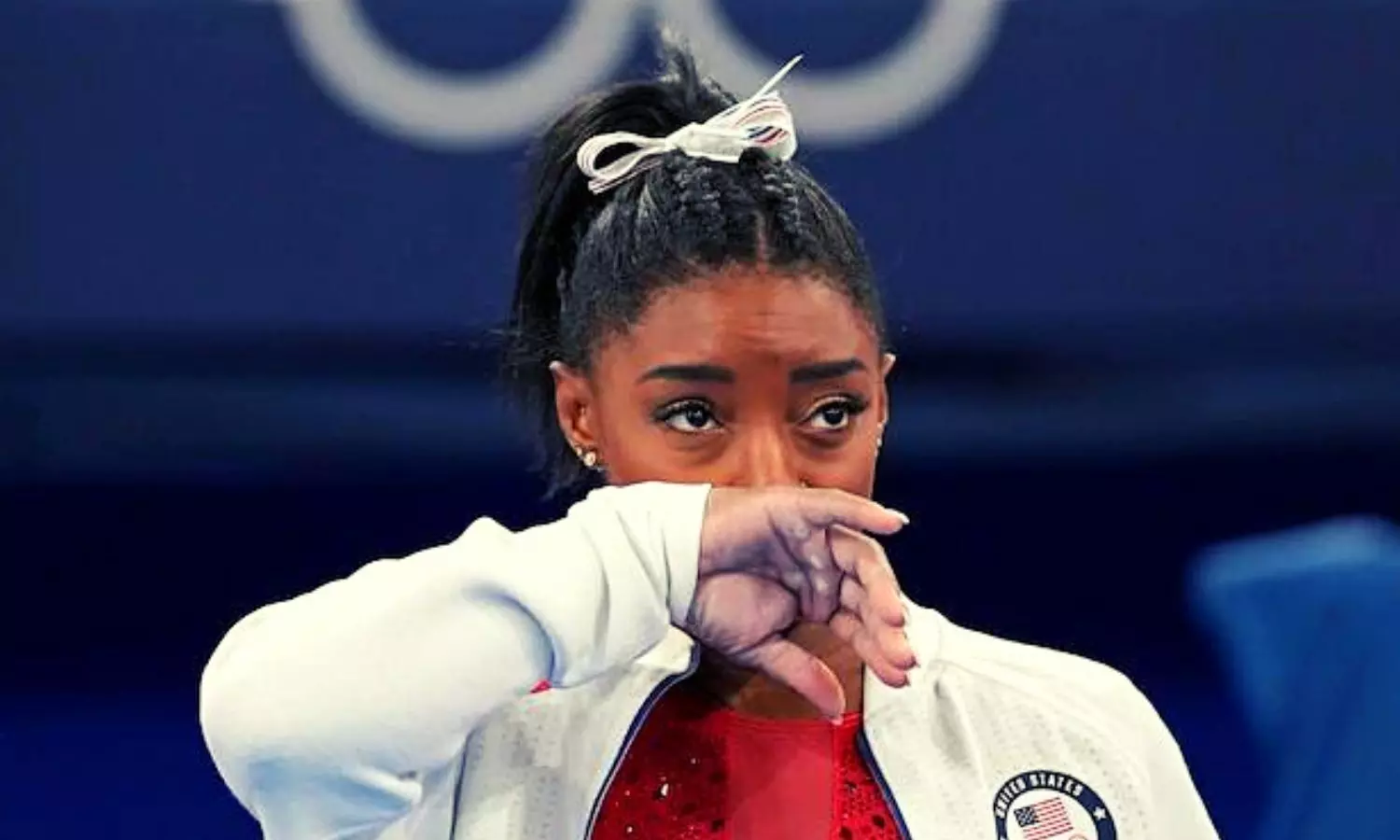Gymnastics
First Osaka, now Biles - 'Mental Health' first, medal later: Sports needs a re-minder
Simone Biles' mid-final decision to withdraw at the Tokyo Olympics is a sharp reminder for us to prioritise the mind over a medal, no matter the cost.

Simone Biles at the Tokyo Olympics (File Photo)
Living in a world where mental health issues are mostly discussed in whispers still, it causes a lot of uproar simply to be candid and say that 'No, I'm not okay.' As Day 4 of the Tokyo Olympics drags to its end-mark, we are being made live witnesses of just how much the Tokyo pressure has built itself up to a ticking bomb as the G.O.A.T of gymnastics - Simone Biles pulled out of the Women's Team All-Around Final citing 'mental issue' woes, as relayed by NBC commentator John Roethlisberger.
Immediately reminiscent of one Naomi Osaka who during the 2021 French Open decided to bring the issue of mental health to the table - pulling it out from being simply hidden under the dining cloth and treated as an 'out of sight, out of mind' element; Simone Biles, at 24, belongs to same tribe of athletes unafraid to open up about mental health.
Causing a lot of flurry, both on and off the Ariake Gymnastics Centre during the Women's Team All-Around Final, Simone Biles, who won 4 golds at the 2016 Rio Olympics and was somehow, automatically 'supposed' to mirror that performance, took this courageous decision and chose mental health over medal.
Earlier in the day, 4-time Grand Slam champion and Olympic debutant, Naomi Osaka also crashed out of the Tokyo Olympics, suffering a shock loss to Czech Republic's Markéta Vondroušová in straight sets, 6-1, 6-4. Playing for the Japanese flag, Osaka produced an error-sprinkled performance in only her third match after taking a 'mental health' break in early June.
Toying with emotions has become a far too simple job with the media doing its bit to pull on every possible string - till the mad tussle becomes unbearable for some and they crumble, desperately in need of a time-out. While we are yet to know the full details of Simone Biles' mid-final decision - it is no easy task to choose the wiser way out and self-prioritize well-knowing how an entire nation's eyes are pinned on her every move and the apparent 'cost' her decision would entail.
The nerves of having "all eyes" on you
While people may be very subjective towards their own dealings, they generally employ a cut-throat objective approach while projecting their hopes on athletes, making them the recipient of alarming pressure and anxiety, some consciously, most unconsciously.
After the prelims of the gymnastics event took place at the Tokyo Olympics on Day 3, Simone Biles took to Instagram to express the amount of pressure she is feeling on herself to perform: "I truly do feel like I have the weight of the world on my shoulders at times. I know I brush it off and make it seem like pressure doesn't affect me but damn sometimes it's hard hahaha!"
With success in just about any arena in life, almost involuntarily and parallelly a meter of expectations also appears, wrapping itself to it like a stubborn umbilical cord. The media hype, the transferring of hopes on a select set of people, et al can sometimes get too taxing, and it is only natural and okay to feel the nerves and take that call - whatever the cost may be. Sometimes, that leap should just be taken.
Not everybody can or should expect to be a Novak Djokovic who during the 2019 Wimbledon Final came out on top of the match against grass court legend, Roger Federer, despite playing in front of a crowd only cheering for Roger. Post-match, Djokovic commented saying, "I like to transmutate it in a way: When the crowd is chanting 'Roger' I hear 'Novak'," and exemplified his mental strength.
The need to re-mind ourselves about the importance mental health
Recently, in the TIME magazine's pre-Olympic issue, Naomi Osaka penned a column where she wrote about the pressure of being in the limelight. In fact, in Netflix's latest documentary on the World No. 2 player, Osaka mentions her struggle with the media glare.
"Perhaps we should give athletes the right to take a mental break from media scrutiny on a rare occasion without being subject to strict sanctions," Osaka wrote in her heartfelt piece.
The 23-year-old who sat out the Wimbledon Championships as well went on to write, "...my No. 1 suggestion would be to allow a small number of "sick days" per year where you are excused from your press commitments without having to disclose your personal reasons." Quite the scathing but much-needed opinions, Naomi Osaka, with one tiny move has managed to rattle at the gates of age-old tradition and pointed out the flaws in the existing structure and the spaces in which it can grow and be better.
Given these eye-opening acts, it brings a strong reminder on just how much it is necessary to rethink how we talk, write about sports and the athletes. First, the awareness needs to take place and as bittersweet as this news was for fans of Simone Biles, it was also a blaring alarm to adapt to a different perspective of how we look at our athletes. It is high time we trade the faulty lens and look at them as just another human being, no matter their 'extraordinary and superhuman-like' performances in their respective fields - perhaps that will make the mindful difference.

